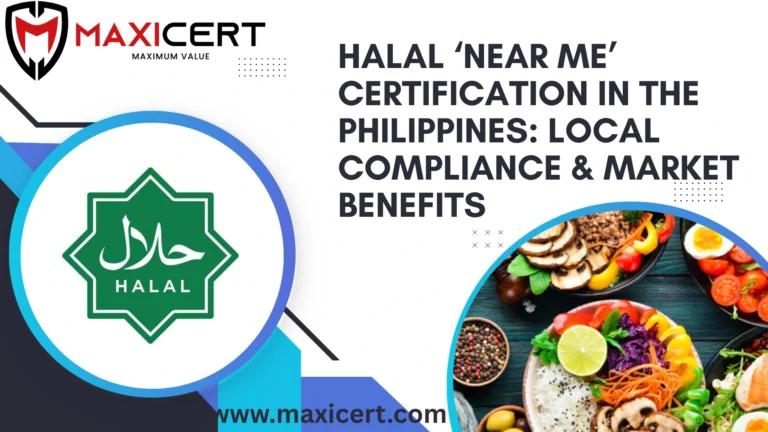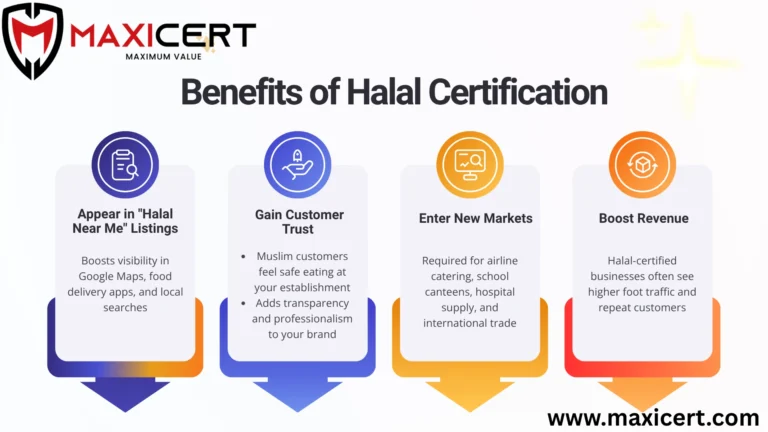Halal 'Near Me' Certification in the Philippines: Local Compliance & Market Benefits

Introduction
Have you thought about how your establishment could show up in “halal near me” searches in the Philippines?
Whether you have a local restaurant, food truck, grocery shop, or a catering business, getting halal certified is a great way to gain recognition among halal-practicing customers. Having the certificate boosts trust and helps you earn the loyalty of Muslim consumers while meeting their religious dietary needs, thus enabling you to expand your brand online and offline.
This guide outlines everything you need to know about halal certification, including who provides it, its significance for local businesses, and the steps to acquire it so you can begin appearing in search results for halal eateries in your vicinity.
Why "Halal Near Me" Matters for Local Businesses
Shrinking Search Intent
- There is a sharp rise in mobile queries relating to “halal near me” within the Philippines.
- Muslim citizens and visitors are actively searching for certified halal options.
Certification Builds Trust
- Without solid proof, claiming “halal” can damage your business.
- Customers, and even search engines, favor certified businesses.
Request A Free Quote
What is Halal Certification?
Halal refers to “permissible” in Islamic law. In the context of food businesses this includes:
- Using only halal-compliant ingredients.
- Preventing any cross-contamination with haram items such as alcohol, gelatin, pork, etc.
- Observing proper hygiene, handling as well as staff training.
Halal certificates are awarded to companies that have complied fully and documented processes, ingredients, and practices attesting to all Islamic dietary requirements.
Read more about Halal Certification.
Who Provides Halal Certification in the Philippines?
In the Philippines, there are different organizations and institutions which can issue halal certification. These bodies include:
IDCP — Islamic Da’wah Council of the Philippines
This is one of the oldest and most internationally known halal certifiers.
HICCIP — Halal International Chamber of Commerce and Industries of the Philippines
This certifying body concentrates on food manufacturers, exporters, and retail businesses.
Muslim Mindanao Halal Certification Board (MMHCB)
This board is well known in Mindanao and is popular with local officials and other Islamic countries.
Philippine Halal Certification Program (under DTI)
This organization helps formulate the Philippine halal standard and works towards boosting exports.
Tip: For better export potential and trust in the global market, choose a certifier recognized by both local and international halal authorities.
visit the offical site for more information.
Who Needs to Get Halal Certification?
- Food trucks, restaurants, and cafes
- Halal meat shops and grocery stores
- Canteens, cloud kitchens, and hotels
- Event and food caterers
- Businesses in meal prep and food delivery services
Benefits of Halal Certification for Local Businesses

Step-by-Step: Obtaining Halal Certification in the Philippines
Step 1: Preparation and Eligibility
Relevant business types include:
- Food service operations as well as food processing and packaging activities.
- Retail grocery and meat shops.
- Personal care products and cosmetics.
- Pharmaceuticals, food supplements, and nutraceuticals.
- Catering, lodges, and cloud kitchens.
With Maxicert, you begin with:
- Assessment of gaps concerning current practices
- Ingredients and suppliers heuristic check for halal compliance
- Internal alignment surrounding processes, roles, and staff responsibilities
Step 2: Control of Logistics and Packaging as Well as Contamination concerns
Before starting make sure that:
- No haram (forbidden) ingredients are in use such as pork gelatin or alcohol.
- The entire supply chain is halal compliant and well documented.
- A Halal Assurance System (HAS) with records is in place.
- During transportation and storage, halal and non-halal items are kept separately.
Step 3: Application and Documentation
With the assistance of Maxicert, you will:
- Prepare a comprehensive list of products and their ingredients along with the sources.
- Submit a company profile along with facility layout plans.
- Formulate SOPs (Standard Operational Procedures) for halal compliance.
- Submit all requisite religious declarations and traceability documentation.
Maxicert will liaise with the certifying body of your choice (IDCP, HICCIP, etc.) on your behalf.
Step 4: Halal Audit and Inspection of the Facilities.
A qualified Halal Auditor will carry out the following activities in your business:
- Check your ingredient storage, labeling, and inventory control systems.
- Check your facility’s cleanliness, hygiene, and sanitation.
- Check for cross contamination of halal and non halal items.
- Staff interviews on halal handling and review of internal documents.
- Evaluate your Halal Assurance System, including critical control points and process control.
Step 5: Receiving and Renewing Certificates
After the audit is completed:
- You will receive an official Halal Certificate for 1 year of validity.
To maintain, you must:
- Annual surveillance audits.
- Documentation and adequately trained personnel.
- Inform Maxicert about any changes in product, process, or supplier.
Maxicert’s assistance does not stop at certification — they provide reminders, retraining, and assistance with renewals, expansions, and ongoing growth.
Required Documents
- Business license
- Supplier documents
- Menus and ingredient lists
- Standard operating procedures for the kitchen and hygiene protocols
- Staff hygiene records.
Local SEO Tips to Appear in "Halal Near Me" Searches
- Create or claim your business on Google Business Profile and use “Halal Certified” as the title of your business
- Post images of the halal certificate and the menu with labels as required.
- Register your business in halal directories such as Zabihah and HalalTrip.
- Emphasize halal terms on your website, posts, blogs, and social media.
- List “halal food near me” in your meta tags and phrases as well as the descriptions.
Common Mistakes to Avoid
- Claiming without certification or authorization
- Cross-contamination with pork or alcohol
- Not training or supervising staff on halal compliance
- Certification that is expired or not current
- Using unauthorized suppliers or ingredients
How Maxicert Helps Your Business Stand Out Locally
Maxicert assists local businesses throughout the Philippines by providing:
- Pre-certification evaluation
- selecting the proper certifying body
- documentation including standard operating procedure templates,
- food handler training on halal protocols,
- scheduled audits, ongoing support,
- guidance on SEO after certification, assisting with listings.
We don’t just help you get certified — we help your business gain internet visibility through targeted marketing so you can be found by potential customers.
Conclusion
Achieving halal certification opens up new opportunities for market exposure as well as deepens customer loyalty. In a densely populated competitive market such as the Philippines, we all know how valuable it is to rank high on the popular “halal near me” searches, and without gaining certification, that becomes impossible.
Want Your Business to Appear on “Halal Near Me” Searches?
For food businesses all over the Philippines, Maxicert simplifies the steps to getting halal certification and makes them affordable. SEO visibility starts from proper documentation, and we are here to support you every step.

Get In Touch

Get In Touch

Get In Touch
Need A Free Estimate?
Get a free consultation and Checklist to get certified for ISO , HALAL, CE Mark Certification.
FAQ
What does "halal near me" mean?
This phrase is an example of a locally focused search for halal food that is certified as such and is readily available for purchase.
Can I claim my restaurant is halal without certification?
Legally right yes, but that’s not a good idea. Certified businesses receive greater trust, and usually are bound by law to only label halal those meals which truly comply with the standard.
Is there a standard time allowance for halal certification?
Yes. It can range between 3–6 weeks as long as your documentation and prepped materials are in order.
Will certification help me appear in Google searches?
Absolutely. With halal certification added to social profiles, business listings, directories and website, the likelihood of showing up in search results for “halal near me” increases significantly.
What's the cost of halal certification in the Philippines?
Prices differ from business type and the scope of services covered. For these types of businesses, there are cheap all-in-one packages for SME offered by maxicert.



